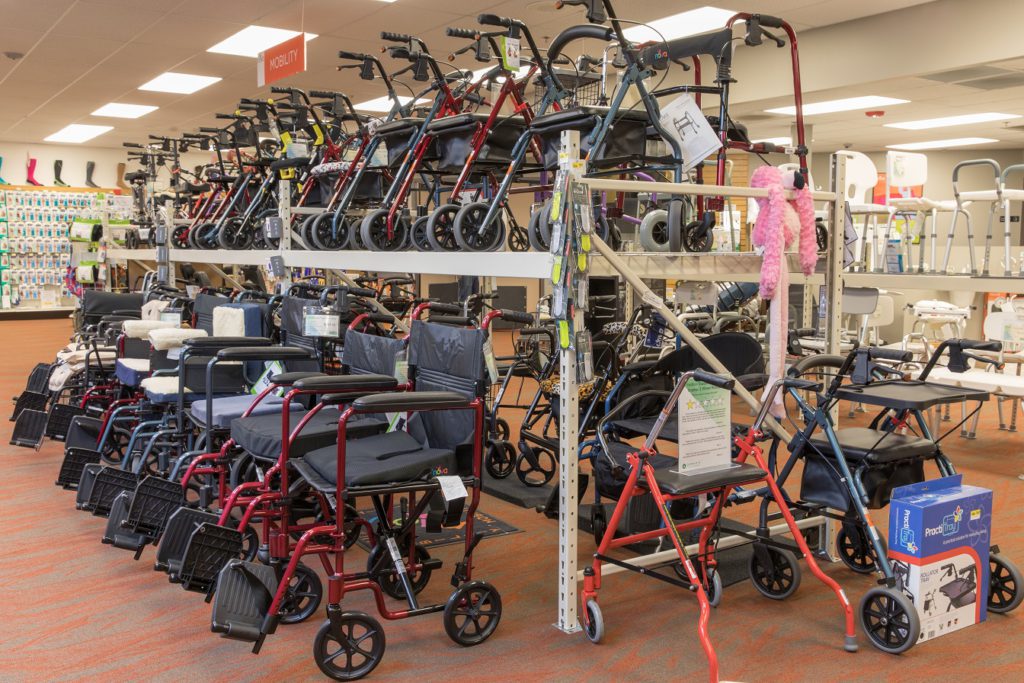You have just been discharged from the hospital and are going to need a wheelchair for a while. One of your parents needs a new wheelchair to get around at family events. A wheelchair for disabled customers visiting your office would be a great thing to have.
If any of these situations sound familiar you are in the right place! Buying a wheelchair in today’s market is not just ‘buying a wheelchair.’ It’s buying a wheelchair for you. Wheelchairs come in all shapes and sizes and are built for just about any body type.
So what wheelchairs should you be looking at? Let’s go over the basics first.
Your Basic Wheelchair Information
This ‘basic information’ is what you need to know before you start looking for a new wheelchair. It’s not wheelchair-specific information, more need- or patient-specific information.
What you need to know:
- Patient height and weight (look at ranges if you are looking for a chair for multiple users)
- Patient hip measurement (when seated, from hip to hip)
- Doorway measurements taken from where the wheelchair will primarily be used
- Bathroom doorway measurements are a must!
- Are there many stairs where the wheelchair will be used?
- Will the user have someone around to help? Is that person in decent physical shape? If not, you will need to look at wheelchair weights.
Those are the questions that need to be answered before you can seriously start looking at a wheelchair. After you have the answers to these questions, we can look at wheelchair brands, styles and more.
Wheelchair Types
Wheelchairs come in many different types. Here’s a list of the most common ones:
- Standard – this is what you think of when you hear ‘wheelchair’
- Pediatric – a wheelchair built for children
- Bariatric or Heavy Duty – these wheelchairs have much higher weight capacities
- Reclining – specialty wheelchairs with a seat back that can recline
- Transport – wheelchairs that cannot be self-propelled
With common wheelchair types come common wheelchair accessories:
- Extended Leg Rests – special, adjustable leg rests used for serious leg injuries
- Seat Widths – most wheelchair manufacturers offer different seat widths on specific models
- Swing-Away Armrests – adjustable arms that can be taken off for easy transitions
- Extended Brakes – longer brake handles for patients with dexterity-related problems
- Seat Cushions – in basically every shape, size, and material
- Bags and Storage – Extra cargo space, when you need to go shopping with a wheelchair
- Trays – used for everything from plates to laundry baskets.
There are more wheelchair accessories than you can shake an extended leg rest handle at, but these are the most requested items in my experience.
What is Your Wheelchair Made Of?
In the “Your Basic Wheelchair Information” section above, I had you ask if the wheelchair user will have someone around to help. I ask this question because steel wheelchairs (and other heavy-duty models) can be really heavy! Thankfully there are wheelchairs available in lightweight materials and styles. Some of the popular options include:
- Steel – the original. These wheelchairs will take a beating but are also among the heaviest. A standard steel wheelchair weighs around 35-40 lbs!
- Aluminum – the most common ‘lightweight’ wheelchair. Aluminum chairs are pretty sturdy and weigh around 35-35 lbs, depending on make and model
- Traditional Wheels – most wheelchairs today have solid plastic wheels, which can add a lot of weight. Spoked, bike-style wheels can save around 7 lbs. depending on the style
- Carbon Fiber – super lightweight… and super expensive. Carbon fiber chairs can weigh as little as 10 lbs. This super low weight comes at a price though, usually north of $2,000
- Transport Chairs – I always mention transport chairs when talking about wheelchair weights. Without the large back wheels, transport chairs weigh around 15-20 pounds on average. If you don’t need to self-propel, transport chairs can be a great lightweight option
Test Driving and Warranties
Medical equipment can be like cars or nice furniture—you don’t want to buy a product without seeing and feeling it first. The most common complaint about wheelchairs I have heard over the years is comfort. Nine times out of ten the comfort complaints I heard were about the seat.
Wheelchair seats come in many different styles. Brands like Strongback are specifically designed to provide back support and comfort. Rear end comfort is a bit easier to take care of; great support cushions are available in nearly every shape and size.
With the complaints about comfort, I also had countless questions about wheelchair warranties over the years. Make sure to look at warranties on any wheelchair you purchase. This goes for the manufacturer warranty and the vendor warranty. If you are looking at wheelchairs online, make sure to find all the warranty information. Sometimes a vendor doesn’t even offer a warranty. Buyer beware!
Test Wheelchairs at Oswald’s Medical Equipment Showroom
I always back up my articles with our in-store practices. We have dozens of wheelchairs in-stock, on the floor, and ready to test. We offer manufacturer and store warranties on every wheelchair we stock.
The most important thing we offer might be our huge in-store selection of cushions. If you have a picky relative who needs some convincing, bring them in and have them try out a large selection. Our medical equipment team will make sure you find what you need.
As always, if you have any questions don’t hesitate to send us an email, give us a call, or just stop by the store. We will be here to help with any questions you have about wheelchairs, transport chairs, accessories and more!

